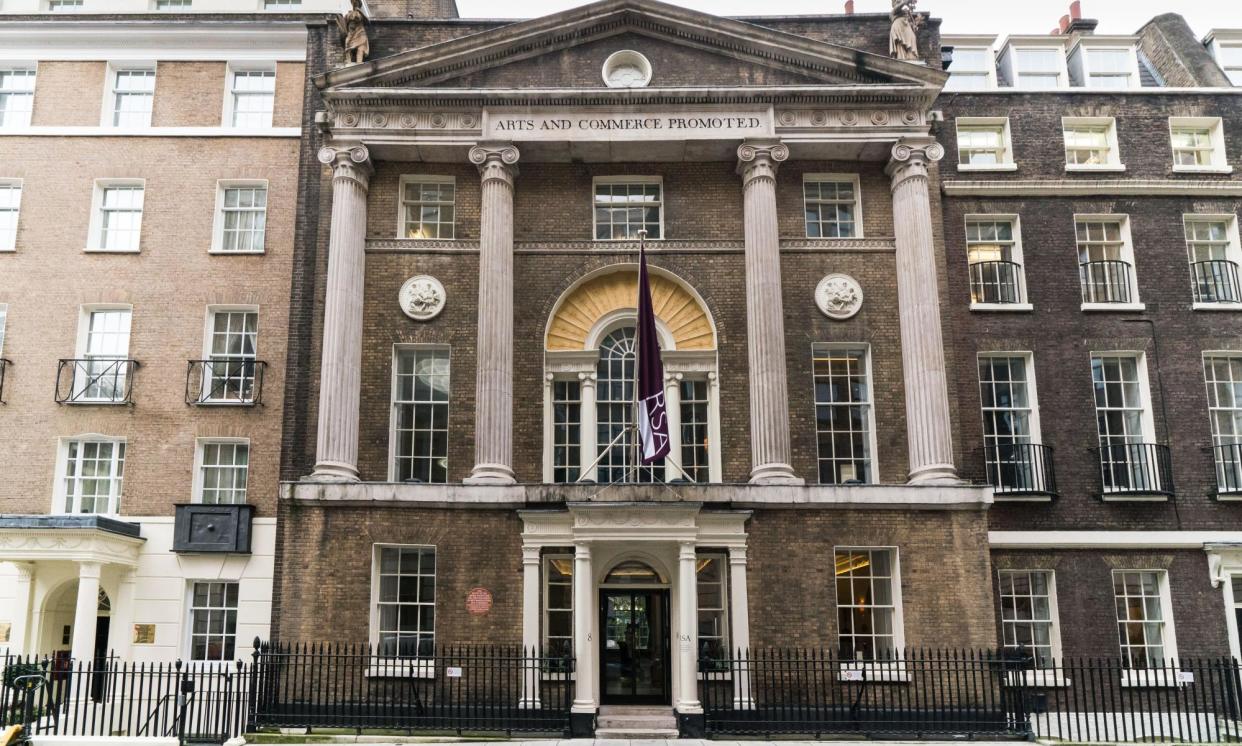Staff and bosses at Royal Society of Arts accuse each other of threats and lies in pay row

Managers and unionised staff at a historic arts charity have accused each other of intimidatory and threatening behaviour in one of the most bitter labour disputes in the charitable sector in recent years.
A long-running row over pay at the Royal Society of Arts (RSA) boiled over in recent weeks, with Independent Workers Union of Great Britain (IWGB) members claiming they are facing a “multipronged attack” while management has complained of a “malicious campaign aimed at damaging” the charity.
The IWGB said RSA had informed four union members, including a union rep, they were at risk of redundancy after staff protested over pay outside the RSA’s flagship Fellows festival at its London headquarters on 2 March. The union rep, who had been involved in pay negotiations, told the Observer she felt she had been targeted as part of a “coordinated and strategic attack” on the union: “Their aim seems to be to undermine the union, to divide people, to make people feel like they are on their own.”
The union said the charity’s management team, which is led by former Bank of England economist Andy Haldane, has also brought in external HR consultants to carry out investigations into seven employees, five of whom are union members, for allegedly breaching confidentiality rules.
The RSA denied it had launched a coordinated attack on any member of staff, union-affiliated or otherwise. It said the allegation by the union was completely unsubstantiated and false. It said it was making adjustments to a small number of roles as it faced challenging financial headwinds and needed to ensure it remained financially sustainable. These changes, it said, were in no way related to industrial action or staff union membership.
The RSA can trace its roots back to the 18th-century coffeehouses of London, and over the centuries it has attracted public figures such as Charles Dickens, Karl Marx and Nelson Mandela. But the last two years have been turbulent, with staff staging the first strike in the organisation’s 270-year history.
The IWGB claims it is not the first time key figures in the union have been singled out. One, Ruth Hannan, had her employment terminated after she was quoted in the Observer. A tribunal later ruled she had been unfairly dismissed for legitimate union activity. The RSA, however, said it was vexatious and unjust for the union to use the judgment as an example of the RSA’s wrongdoing.
The RSA gave a £1,000 pay increase to all staff apart from senior managers in 2023-24, with the minimum salary at the charity increasing to £25,500, which is above the London living wage. But the union rep said the increase did not go far enough in a cost of living crisis, which has seen sharp rises in prices and rents.
“The RSA is an incredibly wealthy organisation,” she said.
The rep accused the RSA of not “supporting staff through a cost of living crisis. Staff are being forced to move out of London and back home with their parents.”
The RSA said that using its reserves to cover ongoing costs would jeopardise the organisation’s financial sustainability. It claimed it had made an improved offer, which it claimed the union rejected without consultation. It said the average salary for staff represented by IWGB was £35,240 per annum.
The president of the IWGB, Alex Marshall, accused the RSA of “union-busting”. “They are trying to silence their workforce by threatening the union democratically chosen by their staff,” he said. Marshall added that it was one of the most brutal disputes he had ever seen in the charitable sector. “The tactics RSA managers have used throughout that would be more at home in anti-union US corporations than a charity,” he said.
The RSA accused the union of “a malicious campaign aimed at damaging the charity and intimidating RSA management by spreading wholly inaccurate and defamatory comments, with the purported purpose of paying employees more money during collective pay bargaining”.
It added that there was an “obvious self-interest in IWGB’s claims to create a negative narrative about the RSA and a positive one for themselves, exploiting our good name and profile in the furtherance of their own publicity”.


